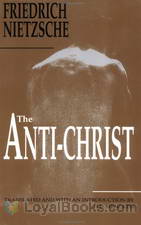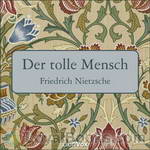|
Books Should Be Free Loyal Books Free Public Domain Audiobooks & eBook Downloads |
|
|
Books Should Be Free Loyal Books Free Public Domain Audiobooks & eBook Downloads |
|
Author Collection |
|---|
By: Friedrich Nietzsche (1844-1900) | |
|---|---|
 Beyond Good and Evil
Beyond Good and Evil
Beyond Good and Evil, by Friedrich Nietzsche A searing indictment of concepts like “truth” and “language” Beyond Good and Evil, by Friedrich Nietzsche is a deeply thought provoking book that forms one of the keystones of modern thought and politics. In this book, Nietzsche takes the position that our subservience to fixed perspectives that are forced on us by our language and our ideals make us incapable of perceiving reality. He propounds the theory that ideals are not fixed but change over time, often dramatically, and end up becoming the exact opposite of what they originally were... | |
 The Antichrist
The Antichrist
Save for his raucous, rhapsodical autobiography, Ecce Homo, The Antichrist is the last thing that Nietzsche ever wrote, and so it may be accepted as a statement of some of his most salient ideas in their final form. Of all Nietzsche’s books, The Antichrist comes nearest to conventionality in form. It presents a connected argument with very few interludes, and has a beginning, a middle and an end. | |
 Thus Spake Zarathustra: A Book for All and None
Thus Spake Zarathustra: A Book for All and None
Friedrich Wilhelm Nietzsche (1844–1900) was a nineteenth-century German philosopher. He wrote critical texts on religion, morality, contemporary culture, philosophy and science, using a distinctive German language style and displaying a fondness for aphorism. Nietzsche’s influence remains substantial within and beyond philosophy, notably in existentialism and postmodernism. Thus Spake Zarathustra is a work composed in four parts between 1883 and 1885. Much of the work deals with ideas such as the “eternal recurrence of the same”, the parable on the “death of God”, and the “prophecy” of the Overman, which were first introduced in The Gay Science... | |
 (German) Der tolle Mensch
(German) Der tolle Mensch
“Der tolle Mensch” ist der Aphorismus 125 aus dem dritten Buch der “Fröhlichen Wissenschaft” und befaßt sich mit dem Thema “Gott ist tot”. Der stilistisch dichte Aphorismus enthält Anspielungen an klassische Werke der Philosophie und Tragödie. Dieser Text lässt den Tod Gottes als bedrohliches Ereignis erscheinen. Dem Sprecher in diesem Text graut vor der Aussicht, dass die zivilisierte Welt ihr bisheriges geistiges Fundament weitgehend zerstört hat. Der unfassbare Vorgang des Todes Gottes würde gerade wegen der großen Dimension lange brauchen, um in seiner Tragweite erkannt zu werden. (Zusammenfassung von Wikipedia.de und Rainer) | |